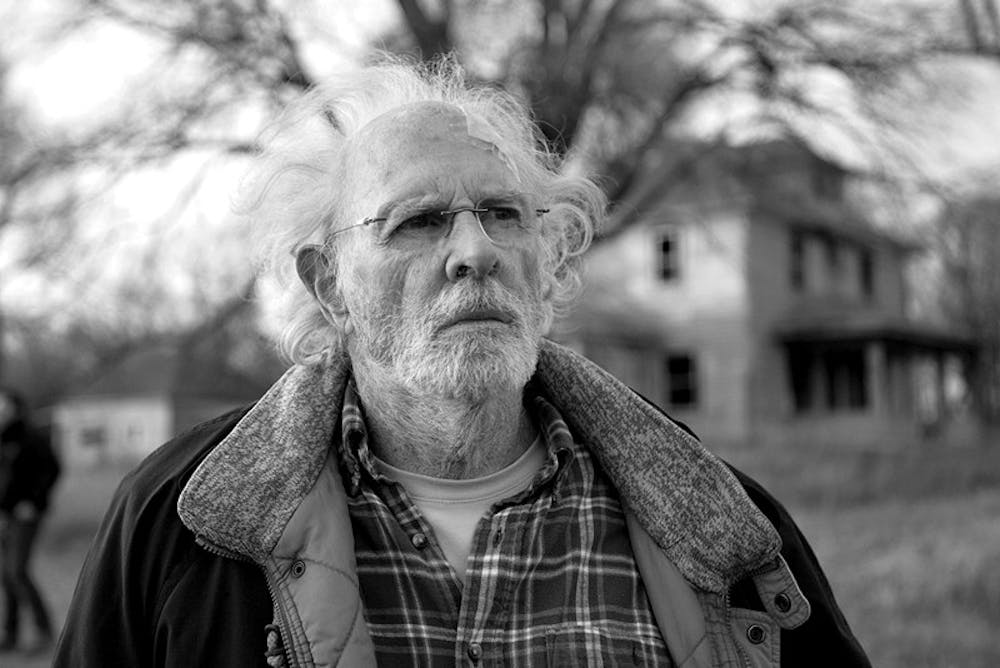Toto, we might be back in Kansas. Cornstalks? Check. Roads that stretch to the horizon? You got it. Days spent with beer and football? All there. While maybe not set in Kansas, “Nebraska” demonstrates director Alexander Payne’s familiarity with small-town America.
The prospects of channelling this Midwestern ambiance into anything fast-paced drop severely if your name isn’t Coen or Capote. Luckily for audiences, Payne instead uses the locale as the setting for an elderly man searching for meaning late in life.
Bruce Dern plays the “semi-coherent” protagonist Woody Grant, a retired Nebraskan living in Billings, Montana with his wife Kate, played by June Squibb.
But his journey starts out as less an American Dream than a pipe dream. Woody falls for a scam — that he has won a million-dollar sweepstakes. Convinced of his newfound wealth, he travels to Lincoln, Nebraska to collect his winnings, a trek that breaks the cycle of his utterly mundane life.
Ignoring the more realistic prognosis of his family, who warn him of the improbability of this windfall, Woody stubbornly sets out on a nearly 1,000-mile walk.
Enter David, Woody’s son. David, played by talented Saturday Night Live alum Will Forte, also lives in Billings, patiently working his job as an electronics salesman and wondering if he should have proposed to his ex. His father attempts to walk to Lincoln on three occasions before David caves and offers to drive, feeling sorry for him and realizing that Woody might not be around much longer. Along the way, he discovers he didn’t know as much about his crazy old man as he thought he did.
Sound like audiences have been there before? They have. But they’ve never been there with Payne. And things are a little different in “Nebraska.”
There’s a chance Payne made the whole film simply to showcase how beautifully he could depict the rural landscape — the sweeping shots earned “Nebraska” a Best Cinematography Oscar nod. The film has received additional acclaim, earning a total of six Oscar nominations. Dern and Squibb, as the matriarchal loose-cannon Kate, have been nominated for Best Actor and Best Supporting Actress respectively.
Most likely, Payne couldn’t resist rewriting the rules to the cliche road-trip-slash-father-son-bonding movie.
Gone is anything objective. Instead, take a look at some family dynamics while an upbeat orchestral score accompanies therolling panoramas. Take from it what you will — except the neighbor’s compressor, as David learns the hard way in one of the few genuinely hilarious scenes. The movie may pass a little too slowly for some viewers, but at least it leaves plenty of time to think.
When the trip does take a detour into Hawthorne, Nebraska, Woody’s birthplace and the home of his siblings, audiences get a somewhat depressing look at small-town life. Alcoholism, drug use and sexual assault are all referenced as serious, recurring problems. Payne plays up the cruelty of Hawthorne’s inhabitants for comedic effect. They all try to mooch off of Woody after learning of his supposed fortune, but Woody’s poor relationship with his hometown lingers in the background of each interaction. Payne’s only misstep may be his alienation of small-town America with his sometimes condescending portrayal.
The story is ultimately about Woody, a man searching for respect from his community even as his grip on reality slowly fades. His life is flawed — his alcoholism precipitated both his poor business decisions and his neglectfulness as a father and husband. But as the layers of the soft-spoken, generous war veteran are peeled away, both David and the audience are able to give Woody the respect refused by his peers.

ADVERTISEMENT




